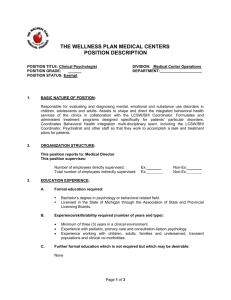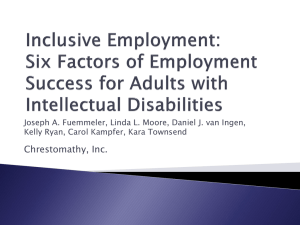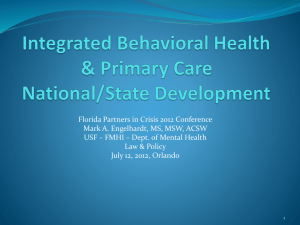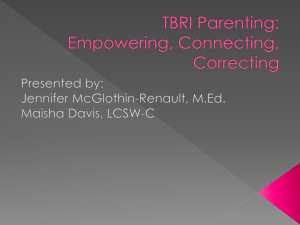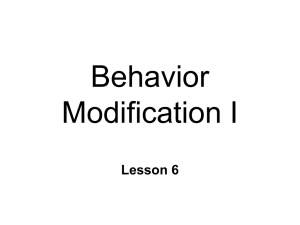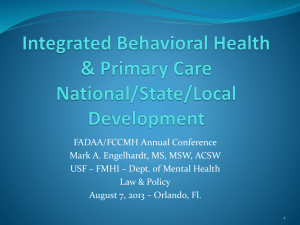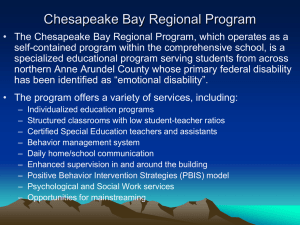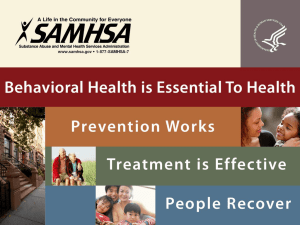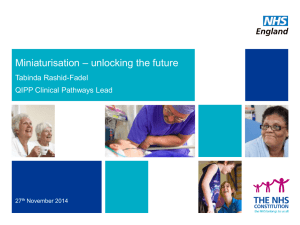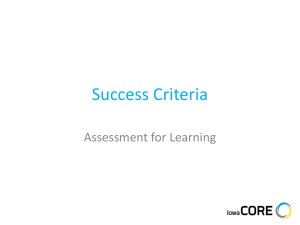Joining Forces to Create Momentum to Overcome Policy Barriers to
advertisement
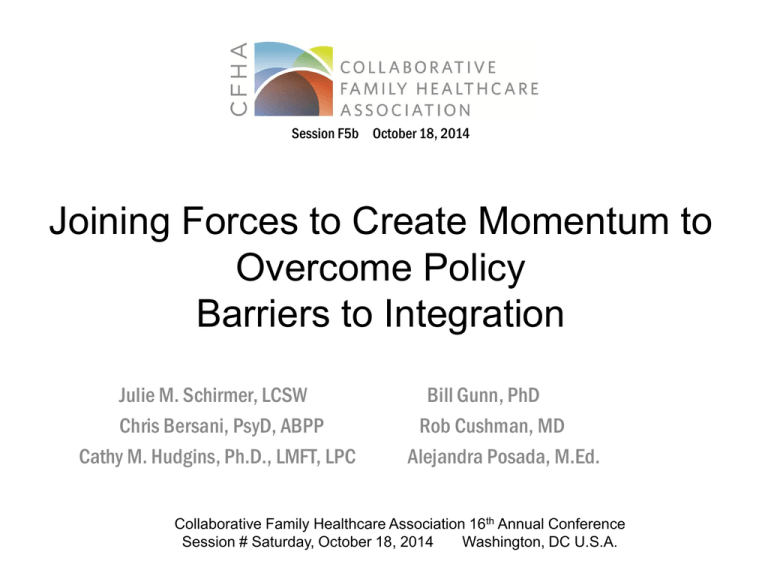
Session F5b October 18, 2014 Joining Forces to Create Momentum to Overcome Policy Barriers to Integration Julie M. Schirmer, LCSW Chris Bersani, PsyD, ABPP Cathy M. Hudgins, Ph.D., LMFT, LPC Bill Gunn, PhD Rob Cushman, MD Alejandra Posada, M.Ed. Collaborative Family Healthcare Association 16th Annual Conference Session # Saturday, October 18, 2014 Washington, DC U.S.A. We have not had any relevant financial relationships during the past 12 months. Identify models of collaborating to advance IBHPC policy reform, Understand the potential barriers, resources, partnerships, breakthroughs and lessons learned, Deepen skills, identify partners an opportunities for taking action in one’s own region to mobilize forces to enhance integration. A question and answer period will be conducted at the end of this presentation. New England Integrated Behavioral Health in Primary Care Learning Community North Carolina Center of Excellence for Integrated Care (COE) Mental Health America of Greater Houston New England States Consortium Systems Collaboration (NESCSO) Health Resources & Services Administration (HRSA) Substance Abuse and Mental Health America Services Administration (SAMHSA) You can begin your slides here and REMOVE THIS SLIDE Emerged from the NC ICARE project. Team of experts provides state-wide integrated care technical assistance, support, and outreach to promote and develop successful, sustainable Integrated Care. Supported in part by the Kate B. Reynolds Charitable Trust. Under the North Carolina Foundation for Advanced Health Programs. Update and reform policies to support IC to create a unified, inclusive IC definition, practice philosophy, and best practice strategies ◦ Policy Summit ◦ Steering Committee and workgroups ◦ Integrated Care Curriculum Consortium ◦ Benchmarking Task Force ◦ Advocacy Engage communities to raise awareness and promote community capacity and collaboration ◦ Presentations to community, organizations, other groups ◦ Website and social media activities Increase the knowledge-base and readiness to expedite IC programs’ success and sustainability Advance IC through evidencebased IC data collection and research Individualized IC training and assistance: ◦ Assessment of progress using Rives INSIGHT dashboard tool ◦ Provide targeted resources to advance the level of integration ◦ Both on-site and phone conference assistance ◦ Connect sites with experts and each other ◦ Providing targeted trainings Concentrated, focused “launch” assistance packages provided to developing IC programs both grant-funded and independently contracted Center of Excellence for Integrated Care (COE) http://www.ncfahp.org/nc-centerof-excellence.aspx Under the North Carolina Foundation for Advanced Programs http://www.ncfahp.org/ Goals: To enhance Education, Policy, and Quality improvement efforts to support Integration of Behavioral Health into Primary Care in New England (IBHPC) Identify policy barriers to integration Health & behavior code expansion to other than psychologists Identify efforts and advocate to integrate BH/PC into state SIM and ACO activities Monthly conference call meetings with academic/foundation/policy champions and stakeholders Quarterly meetings with Regional Directors of SAMHSA, HRSA and CMS Joint presentations/face-to-face meetings Position papers (NASW, CMS) Regional Collaboration among federal (SAMSHA,HRSA,CMS), state (HHS and Medicaid) agencies and communities of interest (IBHPCLC) Supported by NESCSO www.nescso.org and SAMSHA www.SAMSHA.gov to: o o o o Develop functioning sustainable partnerships across six New England state lines. Share experiential outcomes – lessons learned and valuable resources. Champion links within and across Behavioral Health/Medicaid delivery systems. Strategize (deep dives) on issues related to health policy (ACA), technology, data management, finances, and workforce changes. Year One Discussion Topics: Health Homes – Promoting Integration through practice State Innovation Grants and SAMSHA funded Integration Projects- What is scalable? Integration –lessons learned and training resources from Missouri with Dr. Joe Parks. ACA Mental Health Service Expansion Behavioral Health Integration (BHI) Grant Program Christopher Bersani, Psy.D. ABPP Senior Public Health Analyst National Behavioral Health Lead Health Resources & Services Administration Boston, MA Health Center Program 1,300 Community Health Centers 9,200 Service Delivery Sites 21.7 million patients 1.2 million behavioral health patients (2013) Over 6 million visits 6,000+ behavioral health providers 19 Overview Behavioral Health Integration (BHI): Grant to improve/expand delivery of behavioral health services through the establishment and/or enhancement of an integrated primary care behavioral health model at existing CHCs. Specifically, this funding opportunity will: Increase access to behavioral health services; and Increase the number of health centers with integrated primary care and behavioral health models of care. 20 Summary of Funding $54.6 million awarded to support 221 health centers in 47 states and Puerto Rico with awards of up to $250,000 each. Behavioral health services include mental health and substance abuse services. Over 450,000 patients will be served nationwide. 21 Eligibility Requirements BHI grantees are existing Health Center Programs. Grantees are not a newly funded FY 2013 or FY 2014 New Access Points (NAP). Grantees did not request more than $250,000 in BHI Federal funding in Year 1 or Year 2. Grantee demonstrates onsite behavioral health services are currently provided or will be added to the scope via the proposed BHI project. 22 Eligibility Requirements Grantee demonstrates that at least one new onsite full-time equivalent (FTE) licensed behavioral health care provider will be in place within 120 days of notice of award. New FTE can be a single new staff member or contracted provider, or a combination of p/t staff members or contract providers equaling at least 1 licensed FTE. 23 Application Requirements Grantees must implement a plan for achieving or enhancing a fully-integrated primary care and behavioral health services model of care. The plan must include: Use of screening, brief intervention, and referral to treatment (SBIRT) and other evidence-based practices. Use of a team-based, integrated model of care. See Handouts. 24 Ineligible Use of Funds The following uses of funds are not eligible under BHI: Construction costs, including minor alterations and renovation Fixed/installed equipment Facility or land purchases 25 Work Plan Focus Area: Grantees must organize their work plans into four focus areas and identify key action steps and goals for each focus area. Should describe realistic and measureable results. 26 Supplemental Information Form 27 Clinical Performance Measure New Standard Clinical Performance Measure: Depression Screening and Follow Up Numerator: Report the number of patients age 12 years and older who were (1) screened for depression with a standardized tool during the measurement year and, if considered to be depressed, (2) had a follow-up plan documented. Denominator: Report the number of patients age 12 years and older that were seen as medical patients during the measurement year. Provide baseline data if available (if not available, input zero) Provide a realistic and achievable two-year goal 28 Reporting Project Timeframe: 2 years (depending on Congressional appropriations and satisfactory performance) Project Start date: August 1, 2014 Future UDS reports should demonstrate progress toward meeting overall BHI patient targets and goals. BHI progress towards meeting goals will also be required in future Budget Period Progress Report (BPR) submissions. 29 Technical Assistance Contacts BHI TA page http://www.hrsa.gov/grants/apply/assistance/bhi Program Related Questions • Rene Herbert: BPHCBHI@hrsa.gov or 301-594-4300 30 Contact Christopher Bersani, Psy.D ABPP Senior Public Health Analyst 617-565-1470 cbersani@hrsa.gov 31 Question & Answer Period Session Evaluation Please complete and return the evaluation form to the classroom monitor before leaving this session. Thank you!
